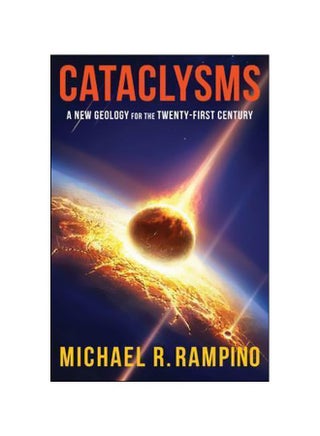استرجاع مجاني وسهل
أفضل العروض




| الناشر | Columbia University Press |
| تنسيق الكتاب | غلاف صلب |
| العنوان الفرعي للكتاب | A New Geology For The Twenty-First Century |
| المراجعة التحريرية | Cataclysms is a useful, well-written and not overly technical summary of Neocatastrophism since the Alvarez team published the initial work in the early 1980's. Rampino paints a lively picture of how work in the area of geoscience is actually done - aided and abetted to good purpose by copious illustrations -- Niles Eldredge, author of Eternal Ephemera As late as 1964, it was hard to find a scientist who believed that crashing meteorites, rather than volcanism, had caused craters on the Moon and the Earth. In this well-written and provocative book, Michael Rampino tantalizes us with his examination of the relationship between astronomy and geology, which he argues could become truly predictive of the past and future. Cataclysms takes us far out, indeed. But if there is one lesson from the history of geology, it is that we should listen to those like Rampino who think outside the box - or even outside the solar system. -- James Powell, author of Fixing the Sky |
| تاريخ النشر | 6/Oct/17 |
| رقم الكتاب المعياري الدولي 13 | 9780231177801 |
| اللغة | الإنجليزية |
| وصف الكتاب | In 1980, the science world was stunned when a maverick team of researchers proposed that a massive meteor strike had wiped the dinosaurs and other fauna from the Earth 66 million years ago. Scientists found evidence for this theory in a "crater of doom"on the Yucatan Peninsula that showed our planet has been the target in a galactic shooting gallery. Seeking to develop "neocatastrophism" even further, Michael R. Rampino adds to this exciting field in Cataclysms, building on the latest findings from leading geoscientists. Rampino recounts his conversion to the impact hypothesis, describing his visits to meteor-strike sites and his review of the existing geological record. His story enables a richer understanding of the science behind major planetary upheavals and extinction events. The new geology he outlines explicitly rejects nineteenth-century "uniformitarianism," which casts planetary change as gradual and driven by processes we can see at work today. Rampino's new geology offers a cosmic context for Earth's geologic evolution, in which cataclysms from above in the form of comets and asteroid impacts and from below in the form of huge outpourings of lava in flood-basalt eruptions have led to severe changes in the Earth's surface. The new geology sees Earth's position in our solar system and galaxy as the keys to understanding our planet's geology and history of life. The author concludes with a fascinating take on dark matter's potential as a triggering mechanism, considering its role in heating Earth's core and spurring massive volcanism throughout geologic time. |
| عن المؤلف | Michael R. Rampino is Professor of Earth and Environmental Sciences within the Life Sciences Department at NYU. He is the co-author of Origins of Life in the Universe (Cambridge, 2008) and author of Climate: History, Periodicity, and Predictability (Springer, 1988). He work has been reported on in the NYT Science section and appeared on NOVA. |
| عدد الصفحات | 224 |

